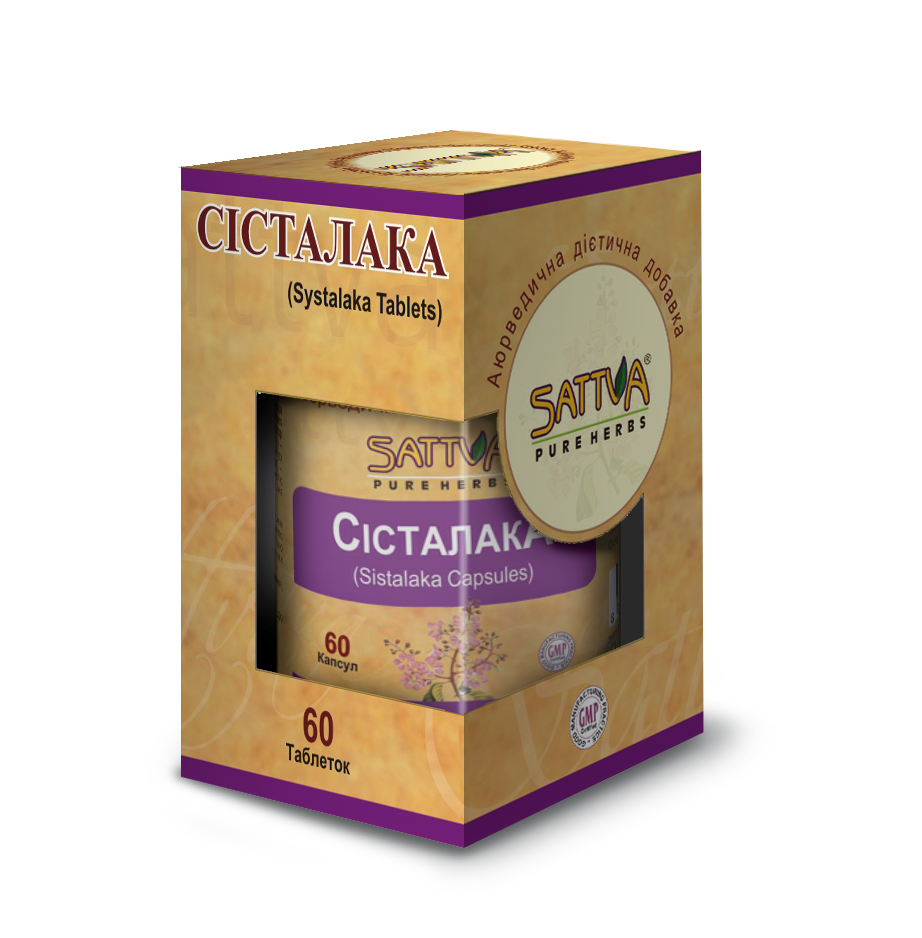Health Problems
Subscribe Newsletter
AYURVEDIC MEDICINE FOR HEALTH OF THE GENITOURINARY SYSTEM
Systalaka Tablets
60 Tablets
There are quite a lot diseases of the genitourinary system. The most common are different specific and nonspecific inflammation. Such inflammatory diseases results from the contact of bacteria with the organs of the urogenital system, due to non-compliance with personal hygiene, lack of protection during sex or due to some diseases of internal organs. In inflammatory diseases of the genitourinary system treatment is based on the identification of the nature of the pathogen and the cause of the inflammation. Otherwise, in the future, you may experience relapse or transition into a chronic form of the disease.
In addition to inflammation, disease of the genitourinary system include various kidney diseases like glomerular disease, autoimmune kidney disease, nephrotoxic kidney disease, obstructive uropathy and others.
Moveover, diseases of the genitourinary system includes bladder disorders, kidney stones, diseases of the genital organs, etc.
Despite the fact that some inflammatory processes of the genitourinary system of our body cope of their own, due to the appropriate level of immunity, but often it needs help.
Sattva Sistalaka tablets can naturally help the body to fight against inflammatory diseases of the genitourinary system. Natural ingredients such as Bhumiamla, Makoi, Gokshura, Punarnava, Devdaru, Varuna, Shilajit and others are part of Sattva Sistalaka Tablets and are very effective in inflammatory diseases of the genitourinary system.
Benefits
- Removes infections of the genitourinary system.
- Carries out detoxification of the urinary tract.
- Helps normalize acidic urine.
- Useful for crystalluria.
- Prevents kidney and urinary stones after surgical removal.
- Acts as an aid in the prevention of urinary tract infections.
- Helps maintain urinary tract health; normalize urine composition and mucosal integrity.
- Do not have any side effects.
The main ingredients of Sattva Sistalaka tablets:
Bhumiamla (Phyllantus niruri) - Inhibits the growth and accumulation of calcium oxalate crystals.
Makoi (Solanum nigrum) - an annual herbaceous plant 10-70 cm. Fruit - black globose berry. Nightshade fruits harvested when they reach full maturity. Contain tannins glikoalkoloidy, asparagine, phytosterol, vitamin C, organic acids. Makoi has antispasmodic, analgesic, diuretic, emollient and anti-inflammatory actions. In Ayurveda it is used for bladder spasms, cramps, gout, and nocturnal emissions and to improve urination.
Gokshura (Tribulus terrestris) - is used as a treatment for recurrent kidney stones. With no side effects, treatment with the extract of Gokshura violates the development of calcium oxalate stones and reduces the size of renal stones. This plant extract prevents damage to the kidney tissue from the effects of calcium oxalate stones. Gokshury fruit extract protects kidney against toxic substances. The saponins present in the plant, preventing the growth of cancer cells in the kidney.
Punarnava (Boerhavia diffusa) - prevents the formation of calcium oxalate stones. Experimental studies show that the extract of the plant gradually reduces the size of crystals of calcium oxalate. In laboratory studies, calcium oxalate stones have completely disappeared with the introduction of high doses of Punarnava. In addition, the diuretic action of this herb helps to eliminate calcium oxalate crystals by increasing the amount of urine.
Devdaru (Cedrus deodara) - Himalayan cedar bark has anti-inflammatory and analgesic properties, helps in chronic inflammation.
Varuna (Crataeva nurvala) - protects kidney cells from toxic substances. Laboratory studies have shown that lupeol, which is part of the plant improves renal function. As a result Varuna reduced levels of urea and creatinine in the blood. Abnormally high levels of these compounds are common symptoms of chronic kidney disease or kidney failure. Lupeol extracted from the bark of Varuna. It also stimulates the secretion of antioxidant enzymes. Admission bark decoction helps to inhibit the secretion of the enzyme glycolate in the liver, which is associated with the synthesis of calcium oxalate kidney stones. Lupeol leads to increased excretion of oxalate in the urine, which greatly reduces the risk of developing kidney stones. Admission Varuna helps reduce levels of enzymes associated with renal disease.
Shilajit (Asphaltum) - a beautiful kidney tonic, normalizes the genitourinary system, strengthens the adrenal glands, helping to prevent urolithiasis, reduces swelling, normalizes the pancreas, and gives youth and strength.
Avoiding diseases of the genitourinary system is quite easy. To do this, you should periodically perform the strengthening of the genitourinary system, and closely monitor personal hygiene, hygiene sex, and general health. To strengthen the urogenital system, you can use vegetable sources of nutrients and various additives in your diet.
Diet and lifestyle:
Avoid taking excessively hot, greasy, spicy, sour and salty foods. Increase fluid intake as water and juices. Increase your intake of anti-inflammatory herbs and spices such as cardamom, green coriander, licorice root, and others.
Avoid working in direct sunlight or in a hot atmosphere, for example, near stoves and boilers.
Ingredients
Bhumiamla (Phylanthus niruri), Makoi (Solanum nigrum), Kasni (Cichorium intybus), Gokshura (Tribulus terrestris), Punarnava (Boerhavia diffusa), Apamarga (Achyranthes aspera), Prashanbhed (Saxifraga ligulata), Devdaru (Cedrus deodara), Varuna (Crataeva nurvala), Ajwain (Andropogon muricatus), Nirgundi (Vitex negundo), Murathi (Glycyrrhiza glabra), Kulathi (Daichos bifflorus), Saunf (Foeniculum vulgare), Palash (Butea frondosa), Shatavari (Asparagus racemosus), Shilajit (Asphaltum).
Dosage
Take 1-2 tablets 2 times per day after meal, preferably with a glass of warm water.
Indications
Urinary tract infections, kidney stones and bladder, bacterial nonspecific cystitis, urethritis, padagra, vaginitis, painful or difficult urination, bladder inflammation, swelling, pain, renal colic, enlarged prostate.
Contradiction
Individual intolerance to one or more ingredients of the formula.
Packing
60 tablets weighing 700 mg ± 10% each in food grade plastic bottle.
Storage
Store in cool dry place, protected from moisture and light. Store at 15-30° C.

